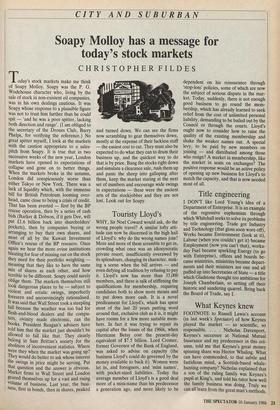CITY AND SUBURBAN
Soapy Molloy has a message for today's stock markets
CHRISTOPHER FILDES
Today's stock markets make me think of Soapy Molloy. Soapy was the P. G. Wodehouse character who, living by the sale of stock in non-existent oil companies, was in his own dealings cautious. It was Soapy whose response to a plausible figure was not to trust him further than he could spit — 'and he was a poor spitter, lacking both direction and range'. (I am obliged to the secretary of the Drones Club, Barry Phelps, for verifying the reference.) No great spitter myself, I look at the markets with the caution appropriate to a sales- pitch from Soapy. It is true that in two successive weeks of the new year, London markets have opened to expectations of collapse and gone on to better things. When the -markets broke in the autumn, London did conspicuously worse than either Tokyo or New York. There was a lack of liquidity which, with the immense bill for British Petroleum looming over- head, came close to being a crisis of credit. That has been averted — first by the BP rescue operation, then by a series of cash bids (Barker & Dobson, if it gets Dee, will put £1.6 billion back into shareholders' Pockets), then by companies buying or arranging to buy their own shares, and most of all by the Kuwait Investment Office's rescue of the BP rescuers. Once again we hear the more ovine institutions bleating for fear of missing out on the stock they need for their portfolio weighting — meaning that they like to have the same mix of shares as each other, and how terrible to be different. Soapy could surely oblige them. The markets themselves still look dangerous places to be — subject to violent and erratic swings, imperfectly foreseen and unconvincingly rationalised. It was said that Wall Street took a steepling fall because the weather was too bad for flesh-and-blood dealers and the compu- ters, ovinity made electronic, ran the books. President Reagan's advisers have told him that the market just shouldn't be allowed to fall like that. They clearly belong in Sam Brittan's society for the abolition of inconvenient statistics. Where were they when the market was going up? They would do better to ask whose interest the swings in price might be serving. Put that question and the answer is obvious. Market firms in Wall Street and London geared themselves up for a vast and rising volume of business. Last year, the busi- ness, first in bonds, then in shares, peaked and turned down. We can see the firms now scrambling to gear themselves down, mostly at the expense of their luckless staff — the easiest cost to cut. They must also be expected to do what they can to drum their business up, and the quickest way to do that is by price. Bang the stocks right down and simulate a clearance sale, rush them up and panic the sheep into galloping after them, keep the market staring at the next set of numbers and encourage wide swings in expectations — these were the ancient arts of the stockjobber and they are not lost. Look out for Soapy.


















































 Previous page
Previous page